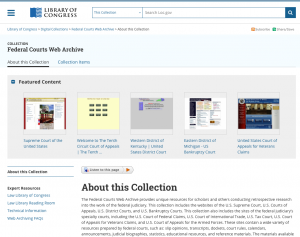This is a guest post by Andrew Winston, senior legal reference librarian, and Brian Kaviar, a Law Library intern. It was first published on “In Custodia Legis,” the blog of the Law Library.
The Federal Courts Web Archive, recently launched by the Library’s web archiving team and the Law Library, provides retrospective archival coverage of the websites of the federal judiciary. The websites in this archive include those of the Supreme Court of the United States, as well as federal appellate courts, trial courts and other tribunals. Coverage generally begins in April 2014, although records from individual courts were captured at different times, and some earlier records are included. The archive is the only comprehensive coverage done court-by-court for the U.S. federal court system.
The federal courts were created under the U.S. Constitution. Article III, Section 1, provides for the U.S. Supreme Court and such lower courts that Congress may establish. These lower courts include the U.S. courts of appeals, the U.S. district courts and the U.S. Court of International Trade. In addition, other federal courts have been established under Article I, Section 8, of the Constitution, including the U.S. bankruptcy courts, the U.S. Court of Federal Claims, the U.S. Tax Court, the U.S. Court of Appeals for Veterans Claims and the U.S. Court of Appeals for the Armed Forces.
Here are the types of cases heard by these federal courts.
- Supreme Court of the United States. The highest court in the land, the U.S. Supreme Court hears cases on appeal regarding matters of constitutional or federal law. The Court also has original jurisdiction over certain matters, meaning that cases between states or cases involving ambassadors are tried before the Supreme Court rather a lower court.
- U.S. Courts of Appeals. Twelve U.S. courts of appeals hear appeals from the decisions of U.S. district courts within their respective circuits, which are groupings of U.S. district courts by region. Another, the U.S. Court of Appeals for the Federal Circuit, hears appeals nationwide concerning specialized subjects, such as international trade, patents, trademarks and veterans’ benefits, among others.
- U.S. District Courts. The U.S. district courts are the general trial courts for the federal government. There are 94 district courts, with at least one district court for each state and the District of Columbia.
- U.S. Bankruptcy Courts. U.S. bankruptcy courts, located in the districts of the district courts, hear cases on personal, business and farm bankruptcies.
- U.S. Court of International Trade. The U.S. Court of International Trade hears cases involving international trade and customs law.
- U.S. Court of Federal Claims. The U.S. Court of Federal Claims hears claims for money against the United States, including contract claims, bid protests, military and civilian pay claims, tax claims, Indian claims and other claims.
- U.S. Tax Court. The U.S. Tax Court hears cases about federal income taxation between taxpayers and the Internal Revenue Service.
- U.S. Court of Appeals for Veterans Claims. The U.S. Court of Appeals for Veterans Claims reviews decisions of the Board of Veterans’ Appeals that have been appealed by claimants.
- U.S. Court of Appeals for the Armed Forces. The U.S. Court of Appeals for the Armed Forces hears cases appealed from the courts of criminal appeals for the armed services.
To learn more about federal courts, the cases they hear and how the work of the federal judiciary is performed, we recommend visiting USCourts.gov.
Court websites support the activities of a number of participants in the judicial system, including attorneys and their clients, pro se litigants seeking to represent themselves, jurors, visitors to the court, and community outreach programs. In meeting the needs of these different groups, court websites generate a number of resources, including (among many others) the following.
- Slip opinions. Slip opinions are unbound decisions distributed ahead of more formal publication. While Supreme Court slip opinions are the most commonly seen, many federal courts have come to post slip opinions in PDF format on their websites as well.
- Transcripts. Transcripts are written records of testimony and court proceedings. Some courts may also make audio recordings of oral arguments in cases available on their websites.
- Dockets. Court dockets provide information about the proceedings in a court case, from the initial complaint or charges, to motions on issues, to the final decision. Dockets are presented online in a variety of formats, with differing levels of detail, and are often indispensable for understanding the chronology and development of a particular case. To learn more about how to research and read dockets, consult “Docket Research,” a research guide prepared by the Yale Law Library.
- Court rules. Court rules govern the procedures for the conduct of business before the courts. They can concern formal matters, such as the format of a document filed with a court, to more substantial issues, such as the grounds for making an appeal. The Duke Law Library has prepared a helpful research guide on court rules.
- Calendars and announcements. Calendars and announcements can provide valuable information about the amount of work that the court is undertaking in a given period, as well as notices of important developments that affect litigants and their attorneys, such as amendments to court rules, reassignment of cases to other judges and fee increases.
- Judicial biographies. Court websites typically provide biographies of their judges. While not every biography is especially detailed, some include not only information about the judge, but also about his or her staff, courtroom, and preferences for litigants appearing before the judge.
- Statistics. Court websites can include statistics on the number of cases heard by the court each year, the types of cases heard, pending caseloads, the time it takes for cases to be decided and other matters.
- Educational resources. As part of community outreach efforts, a number of federal courts provide educational resources for area youth, teachers and people with a general interest in learning more about courts and the law.
- Reference materials. Some federal courts provide reference materials, especially for pro se litigants seeking to represent themselves, such as glossaries of legal terms and model jury instructions.
The Federal Courts Web Archive provides a fascinating look at the business and operations of the nation’s federal courts and how their websites have developed to respond to technological changes and the use of online resources in the practice of law. We invite you to review the archive, as well as other Library of Congress web archives that include legal and legislative materials, like the International Tribunals Web Archive, the Legislative Branch Web Archive, and the Legal Blawg Archive.
The Library has been archiving select websites since 2000 and has now preserved more than a petabyte of web content, including collections of federal executive, legislative and judicial websites; sites of international governments; and national institutions such as the U.S. Olympic Committee and the American Red Cross.

















